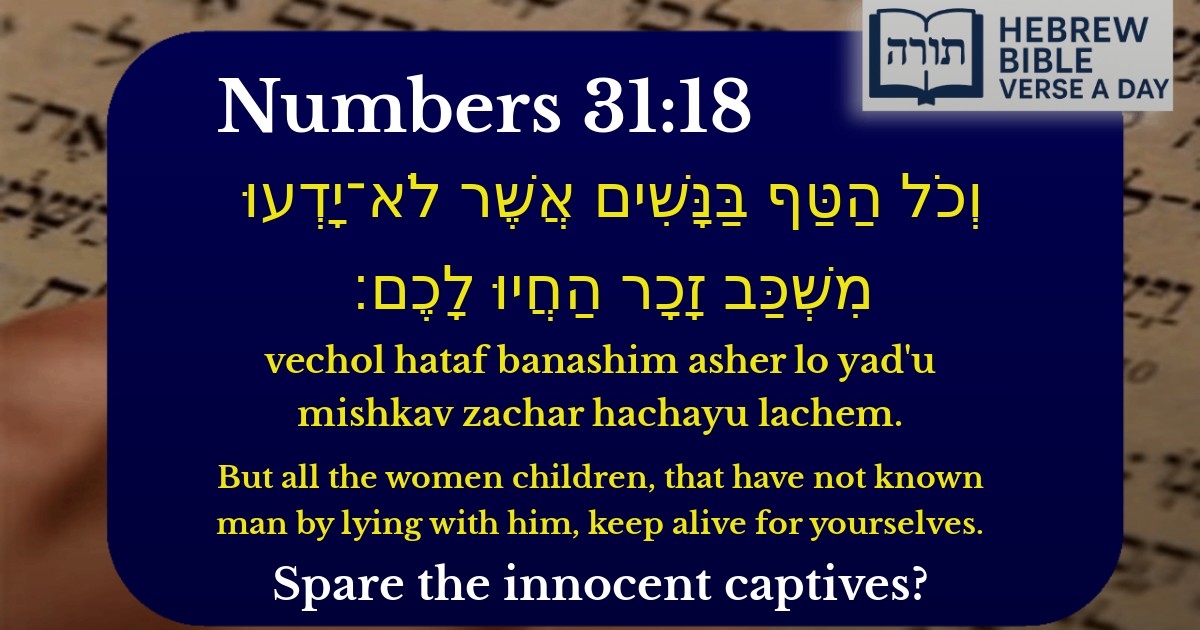Frequently Asked Questions
Q: What does Numbers 31:18 mean when it says 'keep alive the women who have not known man'?
A: This verse refers to the command given to the Israelites after the battle with Midian. According to Rashi and other traditional Jewish commentaries, it means that only the young girls who were not involved in the immoral practices of the Midianites (specifically, idolatry and sexual immorality) could be spared. This was to prevent the influence of their corrupt ways on the Jewish people.
Q: Why were only the young girls spared in Numbers 31:18?
A: The Torah (as explained in the Talmud and Midrash) teaches that the young girls who had not been with a man were spared because they were less likely to have been influenced by the idolatrous and immoral practices of Midian. The older women had already participated in leading the Israelites astray (as seen in the incident with Baal Peor), so they could not be allowed to live.
Q: How does Numbers 31:18 apply to Jewish values today?
A: This verse teaches the importance of guarding against negative influences, especially those that can lead to idolatry or immoral behavior. The Rambam (Maimonides) explains that the Torah often takes strict measures to protect the spiritual purity of the Jewish people. Today, this principle reminds us to be cautious about the cultural influences we allow into our lives.
Q: What is the historical context of Numbers 31:18?
A: This verse comes after the war with Midian, which was a punishment for their role in leading Israel into sin through the incident of Baal Peor (Numbers 25). The Midianite women had seduced Jewish men into idolatry. Therefore, the Torah commanded that only the young, innocent girls could be spared to prevent further spiritual harm to the Jewish nation.
Q: Does Numbers 31:18 mean that the Torah permits taking captives in war?
A: According to Jewish law (based on Deuteronomy 20:10-14 and Talmudic discussions), there are specific rules for wartime conduct. In this case, the young girls were spared under strict conditions—they had to convert to Judaism and follow its laws. The Torah does not permit mistreatment of captives; rather, it provides a structured way to integrate them into Jewish society while maintaining spiritual standards.


Context of the Verse
This verse (Numbers 31:18) appears in the context of the war against Midian, where Moshe instructs Bnei Yisrael regarding the treatment of captive women. The Torah permits sparing the lives of female children who have not been intimate with a man, while requiring the execution of male children and adult women who were involved in the sin of Midian (as per Rashi on Numbers 31:16).
Rashi's Explanation
Rashi clarifies that the phrase "לֹא־יָדְעוּ מִשְׁכַּב זָכָר" ("have not known man by lying with him") refers to young girls who have not reached the age of marital relations. He cites the Talmud (Yevamot 60b), which states that girls below the age of three are presumed not to have engaged in relations. Rashi further explains that these young girls could be spared and eventually converted to Judaism, as they were not complicit in the immoral behavior of Midian.
Halachic Considerations
The Rambam (Hilchot Melachim 8:5) discusses the laws of warfare and the treatment of captives, noting that non-combatants who do not pose a threat—such as young children—may be spared. The verse reflects the Torah's distinction between those culpable for the sins of their society and those who are innocent due to their youth or lack of participation.
Moral and Ethical Lessons
Contrast with Other Nations
Ibn Ezra notes that this command stands in contrast to the practices of other ancient nations, which often annihilated entire populations indiscriminately. The Torah's approach demonstrates a higher ethical standard, reserving punishment only for those directly involved in wrongdoing.